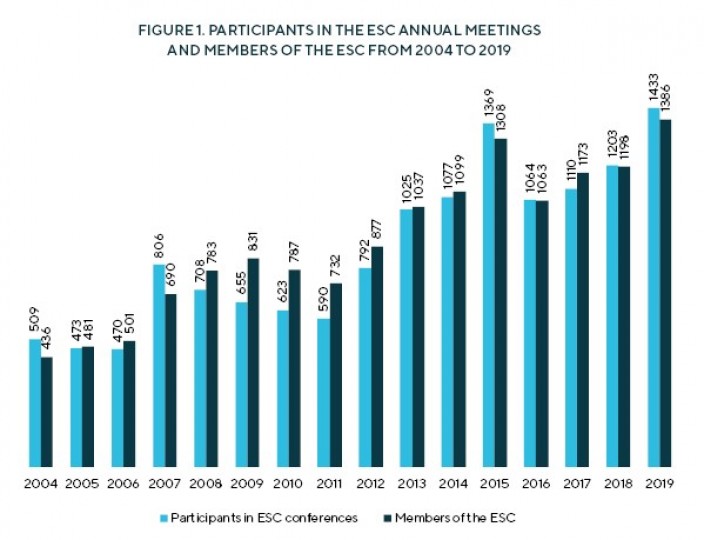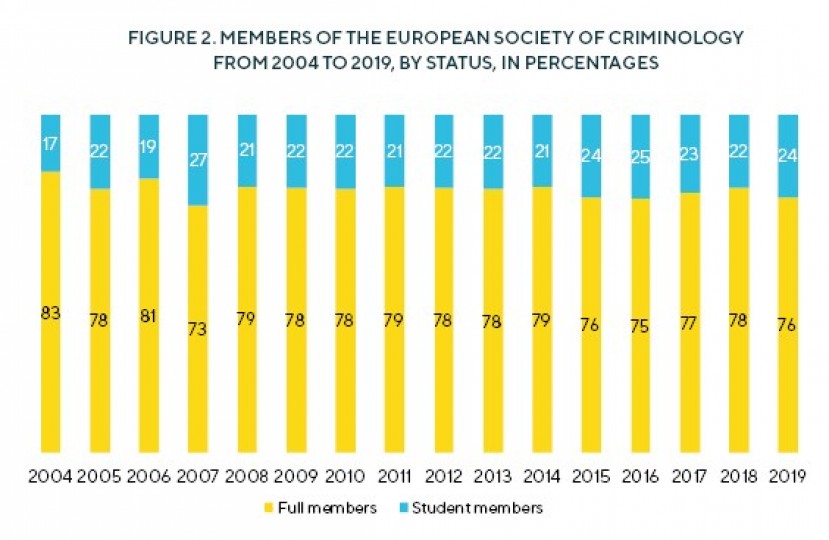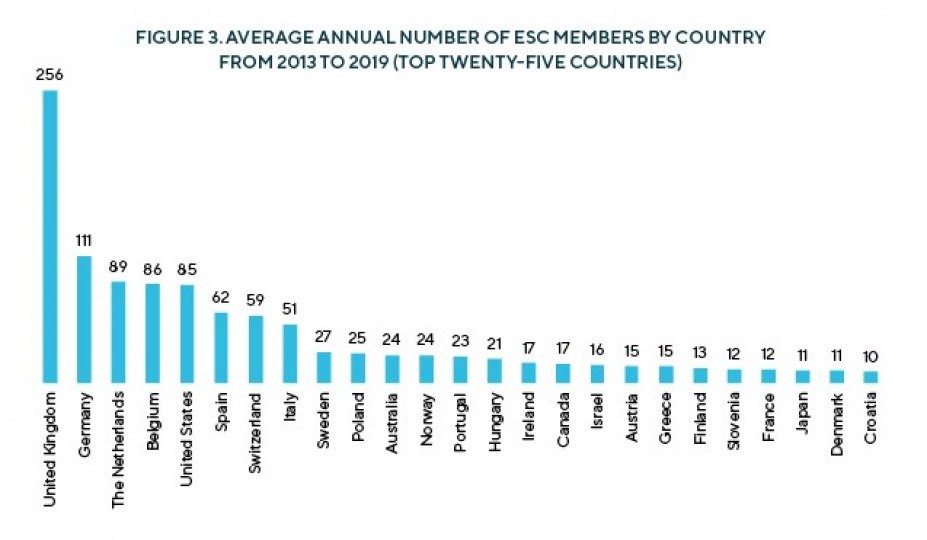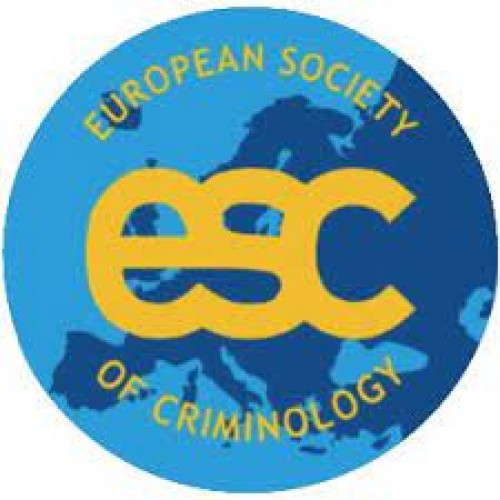Executive Secretary Annual Report 2019
Conference participation and ESC membership
The 19th Annual Meeting of the ESC took place in Ghent, Belgium, from 18 to 21 September 2019. Figure 1 shows the evolution of the number of participants in ESC conferences from 2004 to 2019, as well as the number of members of the ESC during the same period. It can be seen that Ghent, with 1433 registered participants, has been the most successful conference of the ESC. Among the participants in Ghent, there were 371 students (26% of the total) as well as 385 participants (27% of the total) that were not members of the ESC. These two percentages overlap because, among the non-members, 113 were students.
In terms of affiliation, in 2019 the ESC had 1386 members, which is the highest number of members since the creation of the Society. In addition, the fact that roughly one fourth (27%) of the participants in the 2019 Ghent conference were not members of the ESC, means that, in 2019, there were 1777 criminologists linked to the ESC in one way or another (1386 members, 385 non-members that attended the conference, plus 6 participants in the conference with fellowships).
Figure 1. Participants in the ESC Annual Meetings and members of the ESC from 2004 to 2019

Figure 2. Members of the European Society of Criminology from 2004 to 2019, by status, in percentages

Among the 2019 ESC members, there were 337 students, which represent 24% of the total. Figure 2 presents the evolution of that percentage from 2014 to 2019. It can be seen that, since 2005, between one fifth and fourth of the ESC members are students. The percentage observed in 2019 gives further support to the hypothesis proposed in previous reports suggesting that part of the growth of the membership of the ESC since its creation is explained by the transformation of former member students in full members. The stability of the percentage of students is also a powerful indicator of the constant renewal of European criminology.
In 2019, ESC Members came from 54 countries (57 if figures for the United Kingdom are breakdown by nations), covering the five continents. The United Kingdom remained the most well represented country with 299 members, followed by Belgium (137 members), the Netherlands (130), Germany (124), the United States of America (96), Spain (83), Switzerland (58), Italy (55), Poland (39), Israel (33), Australia (29), Norway (25), Ireland (24), Canada and Sweden (21), Portugal (19), Finland (16), France and Hungary (13), Austria, Denmark, Greece and Japan (12), Slovenia (11), Croatia (10), the Czech Republic (8), Bosnia and Herzegovina, Iceland and Turkey (6), Lithuania and Russia (5), China and Romania (4), Indonesia, Malta, Mexico, Serbia and the Slovak Republic (3), Cyprus, Kosovo, Latvia, New Zealand and Nigeria (2), Argentina, Azerbaijan, Brazil, Chile, Estonia, Korea, Luxembourg, Moldova, North Macedonia, Saudi Arabia, South Africa, Uganda and Ukraine with one member each.
Figure 3 presents the average annual number of ESC members by country from 2013 (i.e. the year in which the ESC started having more than 1000 members per year) to 2019. The Figure includes only the 25 countries that had an annual average of at least 10 members for that seven years period. It can be seen that the United Kingdom provided the largest number of members (more than 250 per year), followed by Germany (roughly 110). Then, several groups can be identified: one with three countries that provided between 80 and 90 members per year and country (the Netherlands, Belgium, and the United States of America), another one with three countries that provided roughly from 50 to 60 members per year (Spain, Switzerland and Italy), a third one with six countries that provided from 20 to 30 members per year (Sweden, Poland, Australia, Norway, Portugal, and Hungary), and a fourth one with the 11 countries that provided between 10 and 20 members per year (Ireland, Canada, Israel, Austria, Greece, Finland, Slovenia, France, Japan, Denmark and Croatia). The distribution is similar to the one for 2018 included in the previous report. The only exception is that the Czech Republic has an average number of 9 members from 2013 to 2019. As stated last year, the aim of the Figure is not to establish direct comparisons between countries because that would require weighting the number of members by the population of the country, or by a relevant indicator of the development of criminology in the country, such as the number of programs in criminology or the number of publications in criminology journals.
Figure 3. Average annual number of ESC members by country from 2013 to 2019 (top twenty-five countries)

2019 European Criminology Award
Tapio Lappi-Seppälä, Professor of criminal law and criminology and Director of the Institute of Criminology and Legal Policy at the University of Helsinki, received the 2019 ESC European Criminology Award in recognition of his lifetime contribution to criminology. The award committee —composed by former ESC presidents Frieder Dünkel (Chair, University of Greifswald, Germany), Rossella Selmini (University of Minnesota, United States of America), and Gorazd Meško (University of Maribor, Slovenia)— considered that: “Tapio Lappi-Seppälä is the leading researcher and research organiser in Scandinavia. His main interest is in penology and sentencing research; but his studies on crime and victimization and other studies he organized in the Finnish Research Institute of Legal Policy are outstanding, too. His influence on European criminology, particularly by explaining the so-called Scandinavian exceptionalism with regards to prison population rates and sentencing policies, is outstanding as well. He is asked world-wide as an expert for criminal policy reform issues and his reputation is excellent. His research is empirically based, but also grounded on normative and comparative legal aspects. His profile of a researcher strongly involved in international comparisons by using empirical data and bringing them in a sociological and political theory as well as a human rights-based crime policy context qualifies him as a really interdisciplinary high-profile criminologist”.
The Awards Ceremony took place during the ESC conference in Ghent, and the laudatio of the awardee was delivered by Frieder Dünkel. The acceptance speech of Tapio Lappi-Seppälä, entitled “The ingredients of penal moderation” was published in issue 2019/3 of the Newsletter of the ESC, Criminology in Europe.
2019 ESC Young Criminologist Award
Kjersti Lohne (Department of Criminology and Sociology of Law, Faculty of Law, University of Oslo) received the 2019 ESC Young Criminologist Award in recognition of her article “Penal humanitarianism beyond the nation state: An analysis of international criminal justice”, published online first in 2018 in Theoretical Criminology.
The award committee —composed by Janne Kivivuori (Chair, University of Helsinki, Finland), Anna-Maria Getoš Kalac (University of Zagreb, Croatia), and Catrien Bijleveld (NSCR and Vrije Universiteit Amsterdam, the Netherlands)— considered that: “In this article, Kjersti Lohne examines the field of international criminal justice as a product of situated relations of power as well as an example of emerging novel geographies of penal power. The article shows how international criminal justice raises important questions for criminological understanding of punishment, particularly its epistemological foundations and legitimacy, on the international as well as the national level. The committee particularly emphasizes the comparative strengths of the paper regarding originality of its research question, innovativeness, clarity of thought through excellent expression.
The Awards Ceremony took place during the ESC conference in Ghent, and the laudatio of the awardee was delivered by Anna-Maria Getoš Kalac. An acceptance text by Kjersti Lohne was published in issue 2019/3 of the Newsletter of the ESC, Criminology in Europe, under the title “Inspirations, inclinations and thanks from a young European criminologist”.
EJC Best Article of the Year 2018 Award
In 2019, the ESC delivered for the first time the European Journal of Criminology (EJC) Best Article of the Year Award. It was awarded to Maria Libak Pedersen in recognition of her article “Do offenders have distinct offending patterns before they join adult gang criminal groups? Analyses of crime specialization and escalation in offence seriousness” published, in 2018, in issue 15/6 of the EJC (pp 680–701).
The award committee —composed by Dario Melossi (University of Bologna and EJC Editor-in-Chief), Tom Vander Beken (University of Ghent and ESC President), and Lesley McAra (University of Edinburgh and ESC President-Elect)— considered that: “This article reports on a study about a very hard to reach population (adult gang criminal groups and outlaw bikers) focusing on crime specialization and escalation/de-escalation in offence seriousness prior to gang initiation. The article is very well-written and composed and builds on extremely rich Danish data that allow to make analyses about similarities and differences that are unique to the field. The methods used are state of the art. This article takes the traditional Eurogang research to a new level”.
The Awards Ceremony took place during the ESC conference in Ghent, and the laudatio of the awardee was delivered by Tom Vander Beken.
Fellowships to attend the 19th Annual Meeting of the ESC
In 2019, the ESC granted six fellowships to attend the ESC conference in Ghent. The fellowships were granted to Mirza Buljubašić (Bosnia and Herzegovina), Ayhan Erbay (Turkey)
Julija Jurtoska (Republic of North Macedonia), Sandra Kobajica (Bosnia and Herzegovina), Angelina Stanojoska (Republic of North Macedonia), and Nejra Veljan, (Bosnia and Herzegovina). The increase to 6 fellowships – instead of 5 as in the regulation of the ESC – is explained by the fact that in 2018 and 2017 there were less than 5 fellowships granted.
The panel that awarded the fellowships was composed by composed by Helmut Kury (Chair, Max Planck Institute for Foreign and International Criminal Law, Freiburg, Germany, chair), Eva Inzelt (ELTE Faculty of Law, Budapest, Hungary), and José Angel Brandariz (University of A Coruna, Spain).
European Criminology Oral History Project (ECOH)
The fourth wave of interviews for the European Criminology Oral History Project (ECOH) took place during the ESC conference in Ghent. The following twenty-two interviews, which were conducted in Muenster (2016), Cardiff (2017) and Sarajevo (2018), are already available in the YouTube channel of the European Society of Criminology:
Christopher Birkbeck, interviewed by Gary LaFree;
Jiří Buriánek, interviewed by Eva Krulichová;
Gerben Bruinsma, interviewed by Lieven Pauwels;
José Luis Díez-Ripollés, interviewed by Anabel Cerezo-Domínguez;
Aleksandras Dobryninas, interviewed by Eglė Vileikienė;
Frieder Dünkel, interviewed by Ineke Pruin;
Yakov Gilinskiy, interviewed by Anna Gurinskaya
Ineke Haen-Marshall, interviewed by Dirk Enzmann;
Tim Hope, interviewed by Adam Edwards;
Mike Hough, interviewed by Ben Bradford;
Susanne Karstedt, interviewed by Alison Liebling;
Martin Killias, interviewed by Marcelo F. Aebi;
Krzysztof Krajewski, interviewed by Irena Rzeplinska;
Michael Levi, interviewed by Nicholas Lord;
Friedrich Lösel, interviewed by Caroline Lanskey;
Dario Melossi, interviewed by Màximo Sozzo;
David Nelken, interviewed by Stewart Field;
Paul Ponsaers, interviewed by Antoinette Verhage;
Sebastián Roché, interviewed by Jenny Fleming;
Ernesto Savona, interviewed by Stefano Caneppele
Joanna Shapland, interviewed by Matthew Hall;
Michael Tonry, interviewed by Manuel Eisner.
You can also reach that channel through the ESC Website: http://esc-eurocrim.org/index.php/activities/ecoh. Since 2019, the ECOH project is placed under the responsibility of José Angel Brandariz, former member of the ESC Executive Board.

